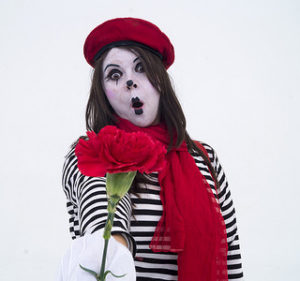 I’ve been traveling the country the past couple of months training a client’s sales managers on their presentation skills — by the time I’m done I’ll have trained nearly 100 people.
I’ve been traveling the country the past couple of months training a client’s sales managers on their presentation skills — by the time I’m done I’ll have trained nearly 100 people.
Interestingly, I’ve found that the more I teach, the more I learn. I’m discovering tons of great lessons I almost forgot I knew!
So now I’m sharing some of the finer points of giving a presentation in this series of Pro Tips. My second book, 11 Deadly Presentation Sins, covered the basics of presenting — the absolute must-dos in order to be successful.
These are some of the smaller, but nonetheless important, refinements that can help take a good presentation to great.
Creating a Stage Picture: A Lesson From Improv
One of the most important things an improv artist does is conjuring a whole physical world from an empty stage. Improvisers don’t use props or sets, so they have to create that world in the audience’s minds.
I once saw an improvisor create a gourmet kitchen from nothing but her movements and gestures. As she moved around the space I could easily envision the stove, the sink, the fridge, the pots hanging overhead, the soup simmering, the spoon stirring, the pepper grinding, the dishcloth wiping — it was all right there.
In fact, the best performances leave you wondering later, “Was there a phone/fishing pole/rock polisher on the stage? I swear I saw it!”
But you didn’t see it, you just envisioned it based on a skilled artist manifesting it in your mind’s eye.
How This Technique Applies to Presentations
We can do the same thing in our presentations to help audiences better understand what we’re trying to communicate.
For instance, in one of my presentations I tell a story about a factory worker on a production line. When I describe what she does, I literally “walk the line” as I speak, going from one end to the other, painting a picture of her different activities with my body and hands, capturing the whole process.
It’s about creating a visual picture to illustrate your words.
Ways to Create a Meaningful Stage Picture
There are lots of different ways to bring your ideas to life with a little physical action — small moves that can make a big impact.
- If you’re telling a story that takes us into the past, walk over to a different spot on the stage to represent that time period, and then move along as your story goes forward.
- If you’re comparing two things, gesture with your hands to one side of your body to represent one of those things, then shift them to the other side to represent the other.
- If you’re making three points, count them off with your fingers.
- If you’re describing your first Starbucks of the day, “hold” that cup in your hand.
- If your story involves recreating a conversation, place that invisible person on stage and look her in the eye.
You don’t have to be a master improvisor or trained mime to pull this off. It’s really just a matter of thinking of your presentation as more than words.
If you want to know more, there’s tons of information online. For instance, here are some simple tips on object and space work. And here’s a pretty funny video pointing to its perils.
So Simple It Sounds Stupid
I know some of these tips, like physically counting off with your fingers, sound stupidly simple, but sometimes the simplest things have the most profound consequences.
As they say in Spinal Tap, there’s a fine line between stupid and clever.
But especially in an age where people DO NOT LISTEN, anything that will enhance audience understanding should be part of your speaking toolkit.
Photo Credit: andreahakimb Flickr via Compfight cc
